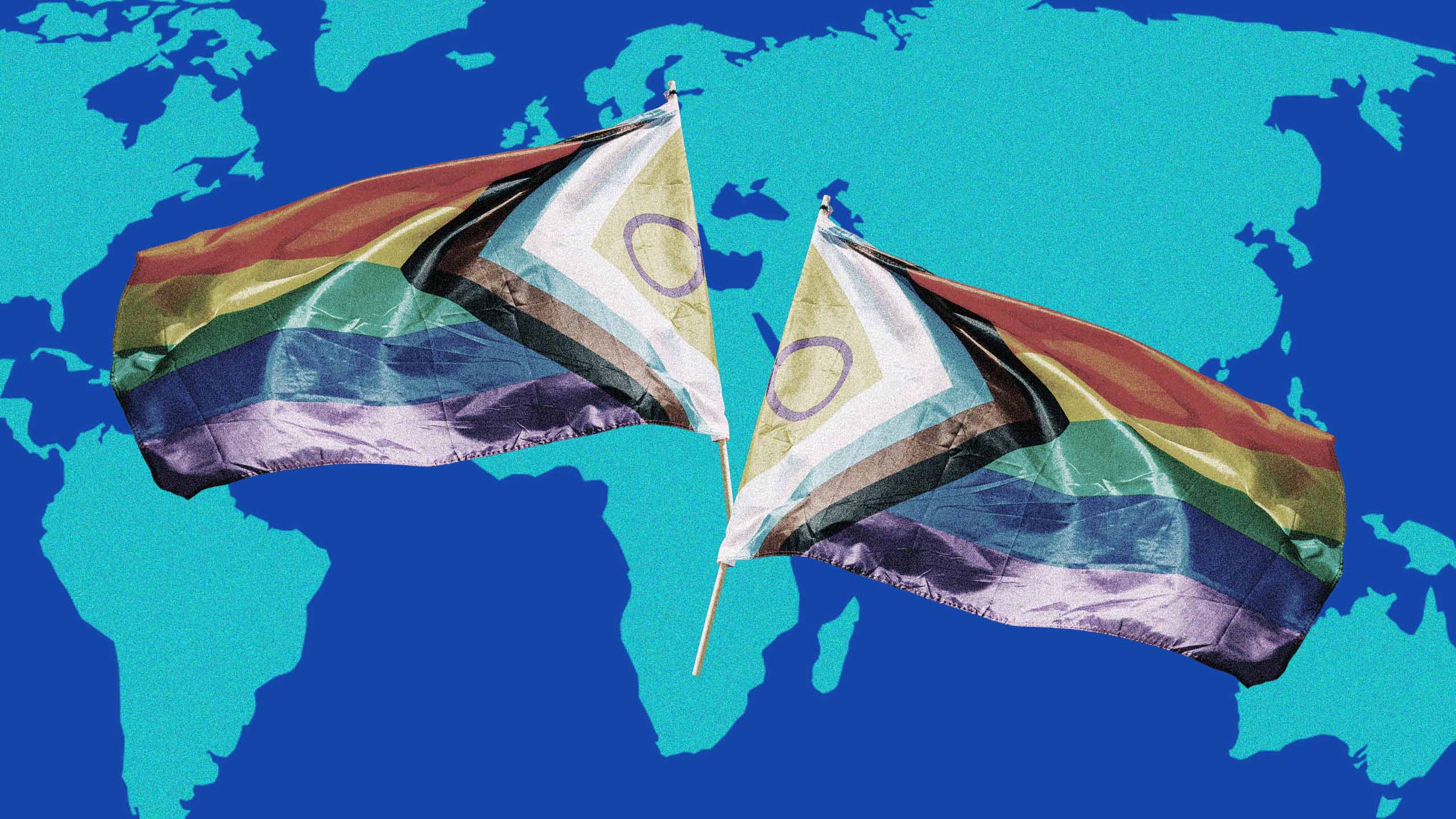It sometimes seems like queers are under attack in every corner of the world, but it’s also true that LGBTQ+ people are making progress in claiming our rights all over the globe. Looking ahead in 2024, these are some of the places where we predict seeing major progress on queer and trans rights.
The fight to decriminalize gay sex
As of the end of 2023, gay sex is a criminal offence in at least 66 countries. That’s down from 72 just two years prior, and over 90 in the year 2000. We expect that long-term downward trend to continue into 2024.
The most likely state to decriminalize gay sex is probably the African nation Namibia, whose High Court heard a challenge to its common law sodomy ban in November 2023. The court announced that it would release its decision on May 17, 2024—that’s the International Day Against Homophobia and Transphobia, which seems like the court tipping its hand in advance. It would also follow several positive decisions around recognition of same-sex couples rendered by the country’s Supreme Court last year.
We’re also impatiently awaiting court decisions on a series of challenges to sodomy laws in the Caribbean island states Dominica, Grenada, St. Lucia and St. Vincent and the Grenadines. Courts in three neighbouring countries have struck down sodomy laws in recent years, and it’s a relatively safe bet these judgments will follow the same pattern, as these states share a common legal tradition and even share courts in some cases.
There are also active challenges to sodomy laws before the Supreme Courts of Malawi, Kenya and Tunisia, though it remains uncertain when or how these cases will be decided.
In Sri Lanka, a bill to repeal the sodomy law, which the Supreme Court ruled was unenforceable in 2017, has been before Parliament since April. While the government nominally supports the bill, it hasn’t advanced it either. Maybe 2024 will be the year?
Finally, the Constitutional Court of Uganda is hearing challenges to the state’s draconian Anti-Homosexuality Act (AHA), which stiffened penalties for gay sex, forbids LGBTQ+ activism and requires people to report suspected homosexuals to the government. The court could strike down the AHA, but leave the original sodomy laws in place.
The fight for same-sex marriage
Two countries look like locks to introduce same-sex marriage in 2024. In Thailand, the newly installed government submitted a same-sex marriage bill to Parliament in December, which has wide support both with the governing coalition and the leading opposition party. The government has also announced plans to expand legal gender recognition for trans people and to decriminalize sex work. The x-factor in all this is whether the Senate, which is mostly appointed by the military, will approve these laws—but they haven’t expressed much open opposition to them either.
On the other side of the world, tiny Liechtenstein, wedged between Austria and Switzerland, appears to finally be ready to pass an equal marriage bill when Parliament resumes in the spring. Parliament gave near-unanimous support to introducing same-sex marriage in 2023, and now that the government has already legalized adoption by same-sex couples, the last objection by the ruling prince, who had threatened to veto a marriage bill, seems to have gone out the window.
A few other countries may also introduce same-sex marriage soon. The Supreme Court of the Netherlands is set to rule on legalizing same-sex marriage in Aruba and Curaçao in the spring. Lower courts have already found in favour of equal marriage, but the ruling is on hold for now. A ruling for equal marriage could also impact the other Dutch Caribbean island country, Sint Maarten.
The prime minister of Greece has pledged to introduce a same-sex marriage bill in the new year, but it’s unclear if there’s enough support in his own party to pass it. If it does pass, expect neighbouring Cyprus, whose president campaigned in 2023 on introducing equal marriage, to follow suit shortly after.
Latvia may have to hold a referendum on its recently passed civil union law, if anti-LGBTQ+ activists succeed in collecting enough signatures by the end of January. Next door in Lithuania, a civil union bill is before Parliament, but has so far lacked sufficient votes to pass final reading. It’s possible a compromise emerges before Parliament is dissolved for October elections. Ukraine is also considering a civil union bill that is backed by President Zelenskyy.
Poland’s newly formed government has pledged to introduce a civil union bill, criminalize hate speech and legalize abortion, while rolling back the anti-LGBTQ+ and anti-democratic laws of the outgoing right-wing government. This first year in office will be a real test of whether new prime minister Donald Tusk’s lofty goals are achievable.
A same-sex marriage bill in Czechia enjoys wide popular support according to polls, but Parliament as of yet hasn’t embraced the issue with any zeal. In fact, there’s also a competing bill to ban it in the constitution. As of now, it’s unclear if legislators will get the bill over the line.
We’ve also not likely heard the last of the fight for equal marriage in India. Last month, the Indian Supreme Court agreed to hear an appeal of its own decision against legalizing same-sex marriage. While it’s unlikely the court will reverse itself, stranger things have happened. In the meantime, LGBTQ+ activists in India are working on getting state governments to expand rights for same-sex couples, and Tamil Nadu may be most likely to advance some kind of civil union, following a court recommendation in that state in November.
Courts are continuing to deliberate several challenges and appeals seeking same-sex marriage in Japan. Lower courts have split on whether or not the same-sex marriage ban was unconstitutional, and the cases will likely end up at the Supreme Court, as the government has shown little interest in advancing LGBTQ+ rights at all.
In the U.S., voters in California will be asked to repeal the state’s defunct constitutional ban on same-sex marriage in November. There are also strong movements to repeal same-sex marriage bans in Hawaii, Michigan and Oregon, and campaigns that are less likely to get questions on the ballot in Florida, Ohio and Wisconsin, where Republicans control the legislative process.
Banning conversion therapy
Banning conversion therapy continues to be debated in many countries. A bill to ban conversion therapy in Mexico is pending a final vote in the federal congress. Ireland, Switzerland and Austria have all begun discussing implementing bans, although actually passing legislation may be a long way off. Austria’s government may have abandoned its pledge to introduce a ban, and the Swiss legislative process is notoriously slow.
In the U.K., a conversion therapy ban has been under discussion for more than five years, while the governing Conservatives attempt to appear progressive while pandering to a rabidly anti-trans base. The opposition is pushing a private members’ bill to ban the practice. In Australia, the states of New South Wales, Western Australia and Tasmania have pledged to introduce conversion therapy bans. If they do, that would only leave two jurisdictions without bans: South Australia and Northern Territory.
Meanwhile, in the United States …
Much of the world’s attention will be focused on the presidential election rematch expected between Joe Biden and Donald Trump in 2024. While obviously a Trump win would be catastrophic for LGBTQ2S+ people and other minorities—not just in the U.S., but in places around the world where queer people depend on aid and advocacy from the U.S.—there are important down-ballot elections across the country.
While highly gerrymandered congressional maps are going to make Democratic victories difficult in many states, Democrats are hoping to take back Congress and win over state legislatures in several electoral battlegrounds. At this point, it goes almost without saying, but any Democratic victories provide bulwarks against the Republican agenda to target queer and trans people and criminalize abortion, and states where Democrats win control tend to become vanguards of expanding LGBTQ2S+ rights and protections.
Other elections to watch
Consequential elections will also happen around the world.
The U.K. is due for an election this year, and if polls are correct, the governing Conservatives will be swept away by the much more LGBTQ+-tolerant Labour Party. Labour has pledged to introduce a conversion therapy ban and to finally introduce a fair and dignified gender recognition system for trans people.
Ireland will also hold referendums in March on amending the constitution to remove sexist language that assumes women are children’s primary caregivers, and inserting language recognizing that families come in many different forms beyond heterosexual married couples.
Austria, Portugal and Lithuania will all have elections that could tip the balance of power enough to help get pro-LGBTQ+ laws over the final hurdles in their respective Parliaments.
In Mexico, people will get to weigh in on what has been criticized as an increasingly authoritarian government under President López Obrador’s MORENA party, which has nevertheless expanded LGBTQ+ rights greatly. Either of the leading presidential candidates, MORENA’s Claudia Sheinbaum and the conservative PAN’s Xóchitl Gálvez could become Mexico’s first female president—López Obrador is barred from running for a second term under the constitution.
Venezuela is expected to have a presidential election, with the U.S. and EU applying pressure to ensure that the process is fair. But given history under the incumbent Nicolás Maduro, who has already jailed his leading opponent and is fomenting war with neighbouring Guyana, that seems unlikely.
Canada will also hold important elections in 2024. Provincial elections will be held in Saskatchewan and New Brunswick, where the incumbent conservative governments have both pushed transphobic “parental rights” laws that require schools to get parental permission to change the pronoun or name students use in school. These elections will be the first test of how these policies fare with voters. Federally, the current minority Liberal government has a confidence agreement with the NDP to keep them in power until 2025, but it’s always possible that an early election could be called in 2024—and both parties are facing a resurgent Conservative Party whose leader has doubled down on “parental rights” transphobia.


 Why you can trust Xtra
Why you can trust Xtra


